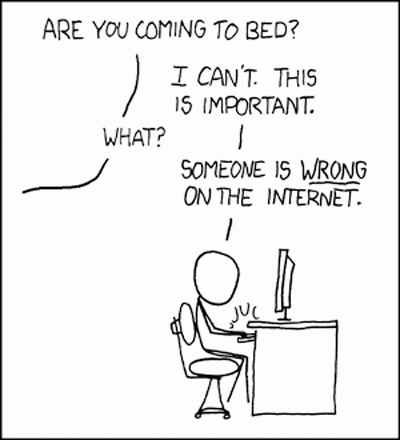On-Line Debating: Making Your Point in the Free-For-All

On-line debating is a sucker’s game. Don’t play. People change their minds based on your example, not your competence with the facts. When they see you as a reasonable person, they will trust the information you bring to them. Confronting people about “the facts” actually drives people deeper into their opinion corners. I wrote about this two weeks ago and shared a well-researched cartoon on the topic.
But, but, but, you say,
How can I let the misinformation stand!
If you want to make your point that someone is lying about something important, there is a way.
Stay on your own turf. Here’s how:
Wrong: Answer in the comments on the offending post.
I’ve made this mistake. Someone posted utter nonsense about something. First, I turned purple and ranted around my office. Then I posted – politely – “That is not true. Actually XX is true and here is a link.” This was followed by a pile-on where I was advised to take my liberal, slutty c&*%t back to Massachusetts.
Time wasted. No one learned anything. I got to be called filthy names by complete strangers.
If you just can’t sleep if you are silent, simply write, “I don’t believe that” or “I disagree with that”. Then mute the conversations. If they call you filthy names, you won’t see it.
Right: Create your own turf
Take a screenshot of the misinformation. Then post your opinion of it. This solves a number of problems:
- By taking a screen shot, you are not supporting traffic to the offending URL.
- By putting it on your own post, you can frame the topic. Your post can say, “XX is true because xxxx. I just saw this misinformation post that said just the opposite. Don’t buy that!”
- By posting on your page, you can control the tenor of the conversation. Do you know that you can remove comments from your Facebook posts? You can do this on your blogs, too. (On Facebook, hover over the upper right corner of the comment. “Remove this” will pop up.)
I suggest you delete ad hominem comments until your audience learns how to behave like adults. This still leaves room for dissenting opinions, as long as they are civilly stated.
Doing this may mean you no longer chime in on your uncle’s posts. He and his friends may still be sharing fake news about things that matter. He and his friends might comment on your posts. You may need to delete some, until they realize they have to behave civilly.
So be it. It will save him from owing you an apology for his friends who called you a tramp. That’s a plus, come Thanksgiving.
This week’s cartoon puts it all together for you: link